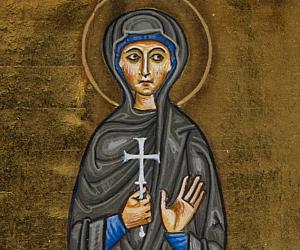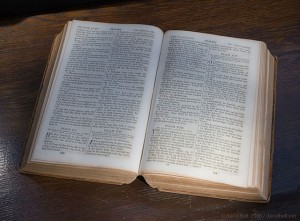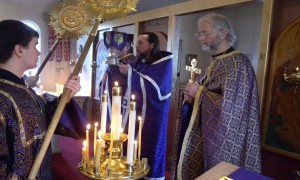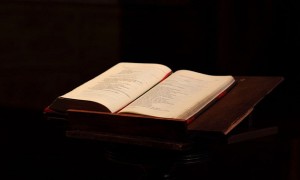The Word of God and the Church from an Orthodox Perspective-2
1 October 2017Consequently, all the functions within the life of the Church pertinent to expressing the faith, determining the truth, and authoritatively interpreting and preserving it, are related to the eucharistic identity of the Church, and for thiat reason they are all the responsibility of the eucharistic community as a whole. Even synodality, the ultimate criterion of the truth, is mutually inter-related with the Eucharist. In 1848 the Patriarchs of the Orthodox East turned down Pope Pius’ IX invitation to participate in Vatican I by saying: “after all, in our tradition neither patriarchs nor synods have ever been able to introduce new elements, because what safeguards our faith is the very body of the Church, i.e. the people themselves”. Thus, consciously or unconsciously, they affirmed that the ultimate authority of the Church lies neither in doctrinal magisteria, nor in any clerical (even conciliar) structure, but in the entire Body of Christ. The only limitation is that this “communal” magisterium, the “many” in the Church’s life, cannot function in isolation from the “one” who is imaging Christ, i.e. the one presiding in love over the local (bishop), regional (protos or primate), or universal Church (Pope or Patriarch). And this “one” is only the visible expression of the Church.
All that has been said so far, being the result of a “eucharistic ecclesiology”, is neither an “excessive generality”, nor a kind of “liturgicalism” and/or “eucharisticism”, a quasi-hermeneutical key to solve all questions.[vi] It is rather a conscious shift of the centre of gravity from a verbal/written authority to a communal and eschatological one; from the word of God, understood in a rational way, to the Church in its charismatic and Christocentric (though pneunatologically conditioned) dimension.
These arguments bring us to other equally important criteria, namely the eschatological and the Christological one. Before moving to these let us return back to what we left open, namely the (post-) modern condition, and compare the modern rational conceptions with the existential situation of the undivided Church.
III. The word of God in modernity and in the undivided Church
a. Liturgy and the word of God in modernity. As we stated at the beginning, the complete break of the relationship between the “word of God” and the “Church” (which according to Nicolaos Kavasilas en tois mysterious symenetai = “is signified in the Sacraments”, i.e in the Eucharist) has its roots in the beginning of modernity.[vii] In the academic community the Christian religion has always been examined in the framework of a Hegelian (in the wider sense) analysis of history. According to this view, the history of humanity is nothing but a battlefield for three conflicting conceptions of life and reality in general: magic, religion, and science. Science testifies to the progressive improvement of the human intellect, while the inferior expressions – that is, magic and religion, which are primarily expressed ritually and sacramentally – fade (according to Hegel and other modernist philosophers, historians of religion and academics) before the superiority of science. The well known anthropologist James George Frazer, in his work The Golden Bough,[viii] formulated the opinion (which became till very recently predominant in the humanities) that magico-religious and sacramental conceptions and ideas are nothing but erroneous theories, and that cultic rituals constitute hopeless and desperate efforts to provide answers for natural and metaphysical phenomena; he characterized religious rituals as primitive science.[ix]
As these views became universally accepted in the academia, the theologians were left in the defence, trying desperately to maintain apologetic attitudes, without being able to formulate a credible, persuasive, and academically accepted alternative position. This was the situation until the end of the 20th century, when Ludwig Wittgenstein, in his study entitled “Remarks on Frazer’s Golden Bough,”[x] completely reversed the modernist views on religion and sacraments, restoring the ancient importance of ritual and the “expressive” dynamics of all religious rites. The academic community’s perception that “mystical rites are the result of primitive or deficient convictions and beliefs” was thus refuted, and it gradually became accepted that these rites result from the need of the believing community not to explain, but to express something unique – in Christianity the experience of the Kingdom of God here and now (albeit proleptically).[xi]
b. Authority of the Bible in modernity and the word of God in the undivided Church.
Wittgenstein was just one among those who challenged the reliability of modernism. But the authority of the Bible is still a crucial issue for all western theologies. And modern Orthodox theologians are not exempt from such an approach. According to the standards of modernism the Bible can be interpreted authentically:
(a) either by a “magisterium”, apparently because some clerics are considered to have received the power and the right from Christ Himself to represent Him as successors of the Apostles. In this way, the word of God is interpreted authentically only by a clergyman, mainly a bishop, and finally the Pope – always as a person, and under any circumstances whatsoever.
(b) or through the word of God again, which means – as most Protestants still believe – the Scripture is interpreted through the Scripture, and it is a matter of proper scientific research. This is why in Protestantism, in order to become a minister (which essentially means a preacher, so that you can expound the word of God) you must have a university education; in other words, one will need a University diploma to explain the Scriptures, with the Scriptures. One can in fact do this from his/her office, his/her place of education. Teachers, therefore, (as the “doctors” in the undivided Church) are, for Protestantism, the instruments by which the authority of the Bible is explained.
Notice what kind of problems this “modern” approach has presented to theology with regard to the authority of the Bible.
(a) With regard to the first (Roman Catholic, but to a certain degree also Orthodox) position, the natural question which is raised is: why should a bishop be regarded as infallible, or why should an entire synod of bishops be considered infallible, or why should the Pope be infallible? And that is where we truly stumble; for we cannot provide satisfactory logical answers, especially nowadays.
(b) As to the second (mainly Protestant) position, another problem is raised, which today preoccupies everyone in the West. How can the Bible be interpreted by the Bible and by scientific analysis, when we know that it was also subject to certain historical and cultural influences, which do not continue to apply forever? This is why some Protestants today are forced to look for a canon within the canon. In other words, they seek a “smaller” canon, within the canon of the Holy Bible. They seek the criteria on the basis of which they can locate whether something in the Holy Bible is truly authentic, and with which we can discern whether something today is not authentic and necessary. Thus, some have reached the point of no longer trusting the Bible. Hermeneutics has developed to such a degree in recent years that the Bible itself is also subjected to any interpretation.
All these have as their starting point the modern approach to the truth, which places the essence of the Church and the essence of the truth in decrees that were shaped in the past. A norm is defined and imposed in the past, and we now struggle to adhere to it faithfully. It is on the surface of this perception that all the problems regarding the authority of bishop, of synods, of the Pope, of the hermeneutics of the Bible etc. are located. This problem was never raised in the undivided Church, where the Scriptures were interpreted within the congregating Church. There what mattered was not just the narration of how things happened; it was the way things will happen, and will be. There the word of God always had an eschatological nuance, coming to us not from the past, but from the future. It is a different thing for us to sit down here and study the Holy Bible; or even in those so-called Bible circles, where one sits down and studies the Bible. What can the Holy Bible tell us, outside the congregation of the Church? It will tell us other things. It is within the framework of worship – and especially of the Divine Eucharist – that we find the reason the Orthodox till this very day melodiously chant (not just read) the biblical lessons Not so much the readings of Vespers – it is not imperative for them to be chanted. But the Gospel and the apostolic readings during the Liturgy are still chanted in the Orthodox services. St. John Chrysostom says somewhere: “we open up a syllable”, because “syllabizing” is a conceptualizing (in Greek syllabe = conception, arresting) by the nous; it signifies that which the mind conceives/grasps noetically. And we help the mind to grasp the meaning. But the word of God can never be conceived/grasped. It is far greater than us. It is the word of God that conceives/grasps us. And Chrysostom goes on saying, that through chanting, the word of God is “opened up”; the syllable is opened up and it incorporates us, as opposed to us “conquering” it. This reminds us the Pauline “gnontes ton Theon , mallon de gnosuentes ypo tou Theou” (knowing God, but rather being known by God).
This conquering tendency of knowledge that we apply to things is the same one that we apply every time we strive to make the Scriptural readings comprehensible, to apprehend the readings! Can one truly apprehend the word of God, or comprehend it? Of course one may wonder: What sort of mysterious and chaotic perception is this? Many Westerners are moved by the Orthodox when they attend their Liturgy, and they usually say “at least you Orthodox have a mystery”. However, it is not about a kind of secret and exotic mystery, which after all lacks any importance. It is a method of knowledge that is based on the communion of persons, and not just on the work of the mind. The Bible cannot speak to us in the same manner when we read it at home, as compared to when the word of God it is read and heard in the Church. There is a slogan in my Church, that the greatest destroyer of the word of God in the Church is the preacher! Theologically speaking, therefore, any attempt to apprehend or comprehend the word of God is not a spiritual but a “modern” phenomenon. And the Gospel for the Orthodox is never just a book one can open and read. It is almost a person. One kneels before it, during the “entrance” of the Gospel the people make the sign of the Cross and kiss it, gestures that surely signify something deeper.
In the undivided Church, even the sermon was a liturgical event, and not something that took place in any kind of hall. The word of God is an event that comes to the community from the eschaton; it has a sacramental character; it is a Eucharistic event, for it is the Word-Logos that the faithful personally meet during the Eucharist, not a rational word. Thus they encountered with the “word of God” in its “fullness” not by comprehending created words, but by coming in communion with the Logos of God in the form of Christ’s Body and Blood. We will elaborate this in some more details later.
[vi] Cf. Th. Stylianopoulos, The New Testament: An Orthodox Perspective, vol. I,Massachusetts 1997, 63, note 35, where he warns some Orthodox theologians against some inconsistent and excessive hermeneutical statements.
[vii] For the relationship between modernity and postmodernity, as well as between Christianity and modernity, see my study Postmodernity and the Church. The Challenge to Orthodoxy, Athens 2002 (in Greek).
[viii] The monumental work of James George Frazer, The Golden Bough: A Study in Magic and Religion, was first published in 1922 (New York).
[ix] For an interesting comparison of Frazer’s views versus those of Wittgenstein, see the recent work of Brian R. Clark (“Wittgenstein and Magic,” in R.L. Addington-M.Addis (eds.), Wittgenstein and Philosophy of Religion, London 2001, p. 12 ff.) and D.Z. Phillips (“Wittgenstein, Wittgensteinianism, and Magic: A Philosophical Tragedy?”, Religious Studies 39 2003, pp. 185-201). See also Clark’s response (“Response to Phillips, Religious Studies 39 2003, pp. 203-209).
[x] Ludwig Wittgenstein, “Remarks on Frazer’s Golden Bough,” Philosophical Occasions, Cambridge 1992 (edited by James Klagge and Alfred Nordmann), pp. 115-155, and in the monograph Remarks on Frazer’s Golden Bough, Doncaster 1979.
[xi] It is obvious that an expressive understanding of the mysteries, without rejecting their logical structure, puts an emphasis on their doxological nature and ecclesiological (and consequently relational) attributes, with special significance given to communion.












